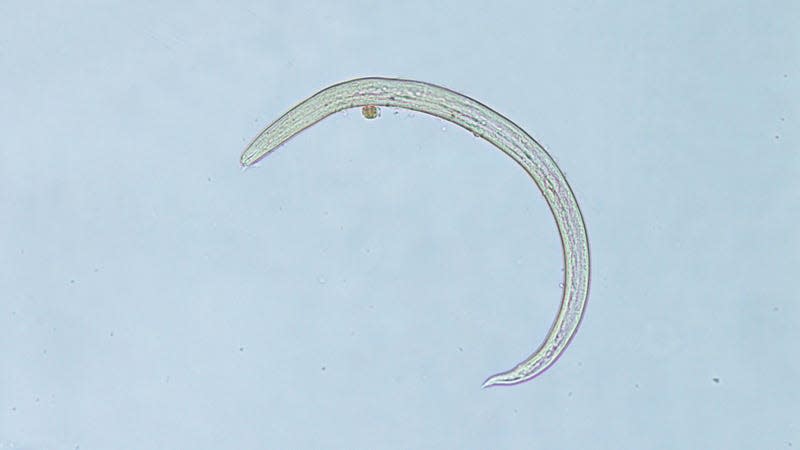An Invasive Brain-Infecting Worm Has Made Its Way to Georgia

The rat lungworm (Angiostrongylus cantonensis) in one of its larval stages of life.
A parasitic brain-infecting roundworm primarily spread by rats and snails is planting down roots in more parts of the U.S., research this week suggests. Scientists appear to have confirmed the presence of the parasite within local rodent populations in the state of Georgia. While human cases are considered rare, these worms can also infect and sicken many other animal hosts.
The parasite is known as the rat lungworm (Angiostrongylus cantonensis)—a name that alludes to its complicated life cycle. Adult worms live, mate, and lay eggs in the rat’s lungs. These eggs hatch into larvae, are coughed out into the rat’s throat, and then swallowed back in through the digestive tract, where they end up in poop. A snail or slug then comes along and either eats the contaminated poop or is in close enough contact that the worms burrow themselves into the animal. Once inside, the larvae grow further and enter their infectious stage of life.
Read more
Dan Harmon publicly addresses his falling out with Justin Roiland for the first time
America Needs A New Canal To Connect The Atlantic And Pacific
The findings, the authors say, “[suggest] that this zoonotic parasite was introduced to and has become established in a new area of the southeastern United States.” It’s also possible that the worms have been in Georgia even longer than known, given that other studies have found infected rats in the neighboring states of Florida and Alabama prior to 2019.
Cases of human rat lungworm are rarely reported in the U.S., though it might be more common than currently thought. Most infections are mild and tend to not require treatment to clear up. However, a heavy infestation can cause permanent neurological damage and even death. The worms can also be dangerous to the surrounding wildlife that they infect.
All in all, the authors say, the existence of the worm in the populated Atlanta area poses “a possible threat to the health of humans and domestic, free-ranging, and captive animals.” More research should be done to better understand the worms’ potential for expanding further into the U.S., they add.
More from Gizmodo
Dealers Are Freaking Out About Buyers Using The EV Tax Credit As A Down Payment
Ahsoka recap: An offscreen cameo tries to save this uneventful episode
Cigarette Sparks Explosion Inside Dodge Charger, Starts House Fire
‘All Of Sony Systems’ Allegedly Hacked By New Ransomware Group [UPDATE]
Sign up for Gizmodo's Newsletter. For the latest news, Facebook, Twitter and Instagram.

